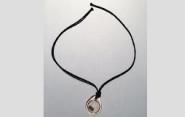Khushi Baby, Started At CEID, Wins UNICEF Award

The start-up company behind a small health-data-storing necklace that could save countless lives – developed at the Center for Engineering Innovation and Design - has won the Wearables for Good challenge sponsored by UNICEF, ARM and frog.
 The non-profit company, Khushi Baby, which developed the device, was named one of two winners of the award Thursday, chosen from 250 submissions from 65 countries. They each receive a $15,000 prize, and incubation and mentoring from the competition's three sponsors.
The non-profit company, Khushi Baby, which developed the device, was named one of two winners of the award Thursday, chosen from 250 submissions from 65 countries. They each receive a $15,000 prize, and incubation and mentoring from the competition's three sponsors.
The device was developed as part of the course "Appropriate Technology in the Developing World," co-taught by Dr. Joseph Zinter, assistant director of the CEID, and SEAS Lecturer Bo Hopkins. Zinter said the course is designed to tackle ongoing global issues. For this particular semester, students were given the assignment of creating improvements to vaccination delivery.
"Challenging our students with real-world problems in the classroom can lead to real-world solutions, and Khushi Baby is perfect example of that," Zinter said.
The necklace stores electronic health data, providing a two-year personal immunization record for children. Using Near Field Communication (NFC) technology to send and receive information through a smartphone, data is synced to the cloud and displayed on a dashboard accessible to health officials. Even without a connection to a central database, health workers can scan the chip, see the health information and update it if needed.
Crucial to the company's goals, the device is operable in even the most isolated communities. In some rural areas of India, parents are required to obtain and regularly update their children's vaccination records. It's an even greater problem if these records are lost, because health care workers can't verify that a child received a particular vaccination.
Ruchit Nagar '15, one of the founders of Khushi Baby, has said his goal for the social enterprise is to have a "scalable impact." It's on course to do just that, as the device has the potential to save the lives of thousands of children from disease. The company currently has more than 200 mothers enrolled in a phase I study in the rural region of Rajasthan. For Phase 2 of the study, which begins next year, they will follow close to 1,000 mothers for about 15 months. They've made a significant amount of progress in a short time, and Nagar said recognition from UNICEF will bring the company even closer to its long-term goals.
"Our next steps will involve participating in the brand new UNICEF innovation accelerator, working with industry experts in design and technology to take our product to the next level," Nagar said. "This is just the start, and we are excited to see how we can bring wearable, appropriate technology for those who need it the most, beginning with infants who need durable medical records."
The device was designed as a necklace as a way to echo the black thread traditionally children wear around their necks to protect them from nazar or the evil eye.
The award is just the most recent of honors that Khushi Baby has won. Last year, it received $25,000 in start-up funding as part of the InnovateHealth Yale Thorne Prize for Social Innovation in Health. Earlier this year, the Khushi Baby team, which also includes Yale-affiliated core members Preethi Venkat and Praneeth Saddawon, received a $250,000 grant earlier this year from the International Initiative for Impact Evaluation (3ie).
SoaPen, the other winner of the competition, developed a wearable soap that acts as a crayon. It's designed to prevent the spread of disease by encouraging hand-washing among children between the ages of 3 and 6.
"If I told you 10 years ago that I thought mobile phones could strengthen national health systems, you would have told me I'm crazy," Erica Kochi, co-lead and co-founder of UNICEF Innovation. "I'm excited to see if wearable and sensor technologies could be the next mobile revolution."
Denise Gershbein, executive creative director of frog, a design and strategy firm, said the competition was designed to "elevate wearable and sensor technology in a way that moves beyond fitness trackers on the wrist" and improve the lives of mothers and children around the world.

